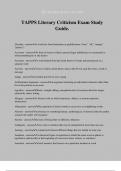©THEBRIGHTSTARS 2024
TAPPS Literary Criticism Exam Study
Guide.
Absolute - answer✔✔a word free from limitations or qualifications ("best," "all," "unique,"
"perfect")
Accismus - answer✔✔a form of irony in which a person feigns indifference to or pretends to
refusesomething he or she desires
Acronym - answer✔✔a word formed from the initial letters of words and pronounced as a
separate word
Acrostic - answer✔✔verse in which certain letters such as the first in each line form a word or
message
Adage - answer✔✔a familiar proverb or wise saying
Ad Hominem Argument - answer✔✔an argument attacking an individual's character rather than
his or her position on an issue
Agroikos - answer✔✔Rustic, straight-talking, unsophisticated, not anxious about his image,
unfazed by others' joking.
Allegory - answer✔✔a literary work in which characters, objects, or actions represent
abstractions
Alliteration - answer✔✔the repetition of initial sounds in successive or neighboring words
Allusion - answer✔✔a reference to something literary, mythological, or historical that the author
assumes the reader will recognize
Alterity - answer✔✔the state of being other or different; otherness
Ambiguity - answer✔✔An event or situation that may be interpreted in more than one way.
Analogy - answer✔✔a comparison between different things that are similar in some way
Anaphora - answer✔✔A rhetorical figure of repetition in which the same word or phrase is
repeated in (and usually at the beginning of) successive lines, clauses, or sentences.
Anecdote - answer✔✔a brief narrative that focuses on a particular incident or event
, ©THEBRIGHTSTARS 2024
Anglo-Norman Period - answer✔✔the period in English literature between 1100 and 1350,
which is also often called the Early Middle English Period and is frequently dated from the
Conquest in 1066
Anthology - answer✔✔A collection of various writings, such as songs, stories, or poems
Antithesis - answer✔✔a statement in which two opposing ideas are balanced
Aphorism - answer✔✔a concise statement that expresses succinctly a general truth or idea, often
using rhyme or balance
Apostrophe - answer✔✔a figure of speech in which one directly addresses an absent or
imaginary person, or some abstraction
Archetype - answer✔✔a detail, image, or character type that occurs frequently in literature and
myth and is thought to appeal in a universal way to the unconscious and to evoke a response
Argument - answer✔✔a statement of the meaning or main point of a literary work
Asyndeton - answer✔✔a constructions in which elements are presented in a series without
conjunctions
Auditory - answer✔✔Having to do with the sense of hearing
Augustan Age - answer✔✔is a style of English literature produced during the reigns of Queen
Anne, King George I, and George II in the first half of the 18th century, ending in the 1740s with
the deaths of Pope and Swift (1744 and 1745, respectively)
Balanced Sentence - answer✔✔a sentence in which words, phrases, or clauses are set off against
each other to emphasize a point
Ballad - answer✔✔A narrative poem written in four-line stanzas, characterized by swift action
and narrated in a direct style.
Baroque - answer✔✔An artistic style of the seventeenth century characterized by complex
forms, bold ornamentation, and contrasting elements
Bathos - answer✔✔insincere or overly sentimental quality of writing/speech intended to evoke
pity
Beat Generation - answer✔✔Group highlighted by writers and artist who stressed spontaneity
and spirituality instead of apathy and conformity.
Biblical Allusion - answer✔✔reference from the Bible, ex: eyes like heaven, the crowd parted
like the red sea.
, ©THEBRIGHTSTARS 2024
Bildungsroman - answer✔✔A German word referring to a novel structured as a series of events
that take place as the hero travels in quest of a goal
Blood and Thunder - answer✔✔A class of work specializing in bloodshed and violence. Many
of these have to do with crime and high emotion. Sometimes abbr. to "blood," "blood books," or
"penny bloods."
Bowdlerize - answer✔✔(v.) to remove material considered offensive (from a book, play, film,
etc.)
Caesura - answer✔✔A natural pause or break in a line of poetry, usually near the middle of the
line.
Carpe Diem - answer✔✔"Seize the day"; a Latin phrase implying that one must live for the
present moment, for tomorrow may be too late.
Chiaroscuro - answer✔✔An Italian word designating the contrast of dark and light in a painting,
drawing, or print.
Chiasmus - answer✔✔a statement consisting of two parallel parts in which the second part is
structurally reversed (Susan walked in, and out rushed Mary)
Cliche - answer✔✔an expression that has been overused to the extent that its freshness has worn
off
Climax - answer✔✔the point of highest interest
Colloqialism - answer✔✔informal words or expressions not usually acceptable in formal writing
Colonial - answer✔✔styles of the British colonies in America in the 17th and 18th centuries,
mainly adapted to local materials and demands from prevailing English styles
Complex Sentence - answer✔✔a sentence with one independent clause and at least one
dependent clause
Compound Sentence - answer✔✔a sentence with two or more coordinate independent clauses,
often joined by one or more conjunctions
Conceit - answer✔✔a fanciful, particularly clever extended metaphor
Concordance - answer✔✔An alphabetical list of the most pertinent works in a given text and a
notation of where the words might be found within that text
Concrete Details - answer✔✔details that relate to or describe actual, specific things or events
Concrete Poetry - answer✔✔poetry that is visually arranged to represent a topic




